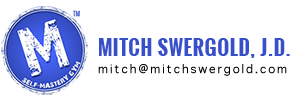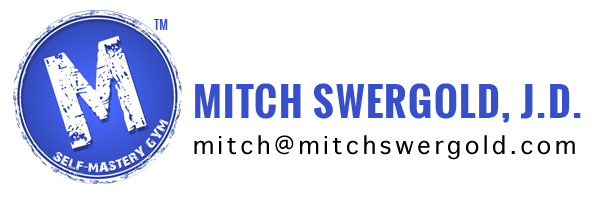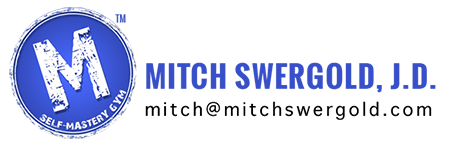Are your people:
- Stressed?
- Overwhelmed?
- Distracted?
- Disengaged?
- Inundated with competing priorities?
Would you like a proven system that:
- Significantly reduces stress and overwhelm, while increasing the resilience of your team?
- Exponentially grows your team’s engagement?
- Improves their time management?
- Increases their productivity?
- Improves their emotional intelligence, team-orientation and collaboration?
- And brings a lot more revenue to your bottom line?
Then let’s talk. Because that’s what I do.
SCIENTIFICALLY PROVEN BENEFITS OF MINDFULNESS AT WORK
Dr. Dan Siegel with Mitch Swergold
I Offer A Variety Of Programs For You And Your Team:
We went to school and learned how to analyze financial statements, contracts or write a brief, but who taught us how to use the most powerful and complex tool in the Universe, the human mind? NO ONE.
With every single thought, you are changing the structure and function of your brain.
This is called, “neuroplasticity,” and its good news and good news. Like it or not, neuroscience has proven that if you’re going through life without learning how to focus your attention in ways that develop your mind as YOU want it to, then the mind is going to develop as nature and evolution want it to: for survival, which doesn’t necessarily serve your modern needs and is often more or less random.
It’s time for the business world and society, in general, to catch up with what neuroscience now offers about how to use this most powerful of tools
That randomness is dictated by the negativity bias, which kept us alive on the African savannah hundred of thousands and millions of years ago. You develop survival patterns, but often, they can be quite harmful since we have not evolved to deal with the daily scenarios of modern life.
You mean this thing has a rudder?!
Studying the mind means learning about how what has seemed like a “black box,” actually works and how we train it – for better or for worse – every day with our every action. Until now, we’ve trained ourselves unconsciously. We weren’t purposefully creating bad habits, nor purposefully getting “stuck.”
But we also weren’t aware of our ability to expand beyond what we perceive to be our limits, to reduce stress, handle adverse situations from a place of strength, build resilience, become more creative, more clear-headed and frankly, happier and healthier. Until now.
We have a choice.
Rather than simply forging along, unconsciously, we can learn how to use the mind, to change the brain, to improve the mind in more effective ways that result in far better, happier results in life.
Sessions are interactive and keep your people engaged and focused, giving them practical takeaways they can utilize immediately in their lives.
Subjects include:
- Conference Mindful Refresh: Helping Your Clients Recover Optimum Focus and Gain Maximum Value From Your Conference
- Leadership and Mindfulness: I take a scientific approach to helping your team understand what motivates people to follow a leader? How can leadership qualities be developed and enhanced through mindfulness practices? How can leaders learn to handle the most challenging situations in new and creative ways? How can they rally and create a cohesive team? How can we develop and use empathy to become better leaders and team players?
- Doing More with Less: Increasing Productivity and Profit while Reducing Stress. What is stress? How does it get triggered, what are its mechanisms, how does it impact our body and mind and ability to handle and respond to difficult situations or simply a sense of overwhelm? What is the difference between healthy and unhealthy stress? Useful and harmful? How can we capitalize upon the former while reducing the latter? And what is the science of habit formation and change? How can we implement it in our lives? And how can we avert very dangerous outcomes where people become so stressed they miss work, they turn to substances or worse?
- Teamwork: Relating at Work and Home. Relationships are a key to success in almost every life endeavor. When workers have good relationships at home and work, their lives flow more smoothly, they are less distracted and better able to focus. When teams work well together, more time is spent on the most constructive projects, rather than fixing. Empathy is crucial to conveying our ideas, meeting our and others’ needs and understanding how to work together better. Through a series of exercises and learning how the mind works, we can improve on all of these and improve our happiness, as well.
- Compliance and Mindfulness: A Refreshing Perspective. How many times does a typical person find themselves in a situation that should be handled according to the compliance rules or laws, yet doesn’t? It may not happen that often, but these events can be catasrophic for a firm. Raising employee mindfulness helps them go beyond simply learning the rules in regular compliance meetings, but actually learning how to maintain an awareness so they spot a situation before it becomes a problem.
- Decision-Making and Creativity: Playground of the Unconscious Mind. The unconscious mind dominates our lives, accounting for 95% of our behaviors, yet most of us have no experience with how it works. Beyond the step of learning how it works is the step of accessing the unconscious mind; not just enabling it, but allowing it to do what it does best; thus, tapping its immense power. Also known as “getting out of our own way,” we learn how to set up the unconscious mind for success!
 These include (and are customizable):
These include (and are customizable):
- 10-45 Minute Meditation Lessons/Breaks
- 60-90 Minute “Lunch & Learn”
- 2-4 Hour Workshop (highly interactive workshop)
- Full Day Workshop
- 2-4 Day Offsite Workshop
- Daily or Weekly Mindfulness Instruction
Daily and Weekly Habituation Programs provide support for developing new mindfulness habits that last. This can be done on-site or over the web, depending upon circumstances.
I highly recommend an ongoing habituation program. Studies at University College London show that it takes 66 days to form a new habit, on average. While there are many variables that impact the time required for new habit formation, this is a good rule of thumb. Mindfulness involves a new way of seeing ourselves and others. It requires dedication and daily practice. It is not something one learns and walks away a different person; that would be unrealistic to expect. Participants will benefit meaningfully just from learning the basics of how the mind functions. However, to optimize your team’s results, I recommend the longer programs and/or daily or at least weekly follow up.
For Conferences and Events:
Conferences are both exciting and hard. You know that feeling when you can no longer count how many meetings you’ve been in and your mind feels numb?
Want a powerful and highly differentiated benefit that can dramatically improve the conference experience for your clients? Want your speakers to feel heard, noticed and appreciated?
Research shows that taking a break from a constant deluge of information, such as what we experience at a conference, helps us to get more focused and pay closer attention. I attended many 100’s of conferences and seminars. Invariably, after days and days of intense meetings, the mind numbs. In fact, this process begins after just 20 minutes. By providing a mini-mind refresher (or better yet, a few), your attendees will feel better and more energetic. Their minds willl be refreshed and focused.
I’m not a spiritual guru and I’m not an academic. I’m the guy who sat in your chair. I get it. Finance and law are stressful and demanding. I just took 9 years of my life and made it so much better. I’ve helped many others learn how to do the same without the necessity of investing 9 years and $100’s of thousands of dollars. I’d like to help you, your team and your clients gain those benefits, as well.
Its the emotional paycheck. The one for which there is no price and no better ROI.




